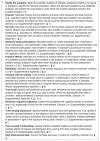Guidelines for reporting methodological challenges and evaluating potential bias in dementia research
- PMID: 26397878
- PMCID: PMC4655106
- DOI: 10.1016/j.jalz.2015.06.1885
Guidelines for reporting methodological challenges and evaluating potential bias in dementia research
Abstract
Clinical and population research on dementia and related neurologic conditions, including Alzheimer's disease, faces several unique methodological challenges. Progress to identify preventive and therapeutic strategies rests on valid and rigorous analytic approaches, but the research literature reflects little consensus on "best practices." We present findings from a large scientific working group on research methods for clinical and population studies of dementia, which identified five categories of methodological challenges as follows: (1) attrition/sample selection, including selective survival; (2) measurement, including uncertainty in diagnostic criteria, measurement error in neuropsychological assessments, and practice or retest effects; (3) specification of longitudinal models when participants are followed for months, years, or even decades; (4) time-varying measurements; and (5) high-dimensional data. We explain why each challenge is important in dementia research and how it could compromise the translation of research findings into effective prevention or care strategies. We advance a checklist of potential sources of bias that should be routinely addressed when reporting dementia research.
Keywords: Alzheimer disease; Big data; Brain imaging; Dementia; Epidemiologic factors; Genomics; Longitudinal studies; Neuropsychological tests; Selection bias; Statistical models; Survival bias.
Copyright © 2015 The Authors. Published by Elsevier Inc. All rights reserved.
Figures


References
Publication types
MeSH terms
Grants and funding
LinkOut - more resources
Full Text Sources
Other Literature Sources
Medical

